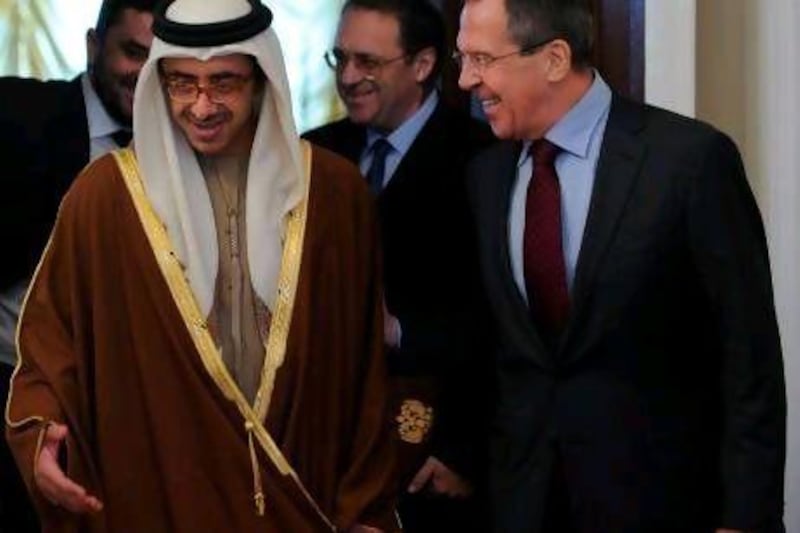BEIRUT //The UAE's minister of foreign affairs urged unity among the international community following talks yesterday on Syria with his Russian counterpart in Moscow.
Sheikh Abdullah bin Zayed Al Nahyan told reporters after the meeting "the international community must speak with one tongue and there must be one voice".
He also urged a peaceful end to the almost year-long uprising against the regime of President Bashar Al Assad.
"Without a doubt, every soul lost in these events is innocent and we condemn the killing of every person in Syria ... although we understand that any regime, country or government has the responsibility to preserve its own stability," he said.
"The military solution is not the answer," Sheikh Abdullah said, "that's an erroneous solution. People have been dying for the past 11 months and that didn't bring any results."
The meeting came as Syrian security forces yesterday shelled areas of Homs for the tenth consecutive day.
Sergei Lavrov, Russia's foreign minister, told reporters his government - which has twice, along with China, vetoed UN Security Council resolutions on Syria - was examining a proposal for an Arab League-United Nations peacekeeping force.
Moscow is "counting on our friends in the Arab League offering us clarification on some of its clauses", he added.
Mr Lavrov also said any peacekeeping force would need the agreement of the Syrian government and could only happen if hostilities were suspended.
"A peacekeeping mission should first have a peace to keep - a ceasefire needs to be reached," he said. "The agreement of the accepting side is needed."
The plan for a joint peacekeeping mission was floated on Sunday during an Arab League meeting in Cairo, where the 22-member bloc also announced an end to its own observer mission to Syria. It was suspended last month amid increasing violence.
A statement issue by the League said it also planned to "open channels of communication with the Syrian opposition, represented by the Syrian National Council (SNC) and offer full political and financial support".
The statement did not elaborate on what sort of help would be provided.
Damascus immediately rejected the Arab League's latest proposals. Syria's ambassador to the League, Ahmed Youssef, was quoted by state media saying Qatar and Saudi Arabia in particular were "living in a state of hysteria after their last failure at the UN Security Council to call for outside interference in Syria's affairs".
Sheikh Abdullah said the Security Council had failed to Listen to the Arab League, "which is closer at the emotional, geographical and informational levels to what is happening in Syria than any other party", the UAE's Wam state news agency quoted him saying.
The Britain-based Syrian Observatory for Human Rights said yesterday the attempt by regime forces to storm Rastan in the province of Homs left at least three soldiers dead. Rastan has been held by the rebels since late last month. The town was taken by defectors twice in the past only to be retaken by Syrian troops. It is the hometown of the Mustapha Tlass, the former defence minister, who held the post for more than three decades, mostly under Mr Al Assad's father and predecessor, the late Hafez Al Assad. Human rights organisations say security forces have killed more than 500 people in Homs since they began bombarding parts of the besieged city on February 3.
"The army of Bashar Al Assad destroyed our homes," said Abu Ibrahim, a refugee from Homs who fled across the border to Lebanon.
"Before, we were bombarded by mortars or rocket-propelled grenades, but now they are using tanks and helicopters," he said, adding his 10-year-old daughter has refused to eat since seeing dead bodies in the city.
The Syrian Red Crescent and the International Committee of the Red Cross (ICRC) said their volunteers were distributing food, medical supplies, blankets and hygiene supplies to thousands in Homs.
"The population, particularly the wounded and sick, are bearing the brunt of the violence," the ICRC's Marianne Gasser said in a statement.
The Arab League is now expected to ask the UN Security Council to approve plans for the joint UN-Arab peacekeeping force that would oversee a ceasefire in Syria.
The League is also putting a resolution - almost identical to one calling for Mr Al Assad to step down that was vetoed this month in the Security Council - to the UN General Assembly as early as Friday.
While Moscow and Beijing are again expected to oppose the resolution, there is no power of veto in the General Assembly. But its resolutions are not binding.
Yesterday, China said it would back continued Arab League mediation in Syria. Chinese Foreign Ministry spokesman Liu Weimin however, would not be drawn on whether Beijing would support sending in peacekeepers.
zconstantine@thenational.ae
- With additional reporting by Agence France-Presse, Reuters, Wam and the Associated Press





